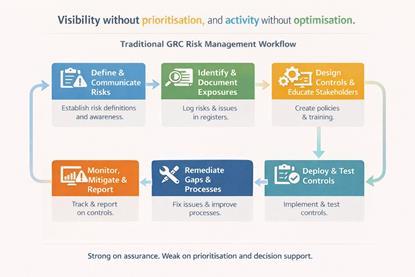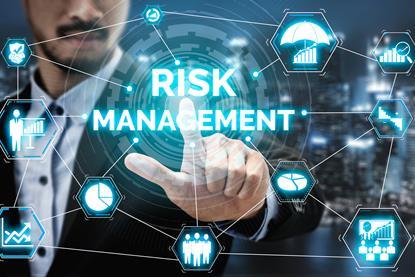Expert Views
Beyond compliance: 5 essential actions strategic risk leaders must take in 2026
Enterprise risk management often promises insight but delivers assurance. As boards push for clearer, risk-informed choices, risk leaders need to move beyond compliance-driven GRC workflows and towards decision-focused measurement that links risk to objectives, an approach Face the Risk is helping organisations put into practice.
Their health in your hands
Employees are demanding more from their healthcare and their benefits. Organisations must now act not just as insurer buyers, but as stewards of workforce wellbeing, while still balancing long-term resilience.
From silos to strategy: how boards are rethinking risk
Webinar: With boards more engaged, our next mission is clear: offer a wide-angle lens on how risks interact, and why risk management and opportunity can co-exist. Our panellists share candid insights on how to turn silos into the strategies a board wants to see.
Why net zero progress is stalling – and what risk leaders must do next
Many organisations are struggling to turn climate ambition into meaningful action. This exclusive video explores what is really holding businesses back - and what risk leaders can do to regain momentum.
Building a forever business: BHSI’s European growth strategies
Since 2016, Berkshire Hathaway Specialty Insurance (BHSI) has taken a measured, disciplined approach to building its presence and product lines across Europe. Alessandro Cerase, Head of Europe at BHSI, shares the company’s latest advances and future plans in the region.
DORA: The buck now stops at the top
In a new regulatory era heralded by DORA, accountability is on a whole new level. If you are a decision-maker, you could be held responsible for compliance failures far down your vendor chain. Companies must be insurance ready, warns BHSI’s Koen Cambré and Adrienne Sitbon.
SR 500: Cyber resilience takes centre stage
Previously a back-office function, resilience in the digital space is now in the spotlight. At an SR:500 roundtable in asssociation with Marsh, risk leaders explored how AI, regulation and culture are highlighting new strategies and demanding board-level attention.
Asia: The ultimate resilience test
Asia has powered the global economy, yet disaster preparedness remains its greatest vulnerability. Resilience, not growth alone, will defi ne the future.
Why workforce resilience should be on every risk manager’s agenda
In an interview with StrategicRisk, Darren Holmes, Risk Advisory Partner in Marsh’s UK Risk Management Practice, explains why resilient workforces are essential to continuity, culture and competitiveness, and what risk professionals must do to support them.
Parametric insurance: why risk managers are embracing this fast, flexible tool
Offering speed, flexibility and a way to close protection gaps, parametric insurance is gaining ground as a valuable complement to traditional cover, says Steve Harry, managing director of parametric solutions UK at Marsh Risk Analytics.
Distraction not dishonesty
Negligence claims against lawyers are growing in severity. Travelers Europe senior risk management consultants Philippa Wilkin and Paul Smith explain why distraction caused by technology could be at the heart of the problem.
No time for digital downtime
Data centres are the unseen powerhouses of our digital world – but AI is pushing their operational limits. Adrian Oxley explains how, by designing policies that reflect engineering realities and specific needs during and after construction, FM can help data centres remain resilient as demand surges.
Captives 2.0: Unlocking strategic value from your captive programme
As captives grow in size and sophistication, risk managers are being urged to revisit how these vehicles support strategic risk, resilience and revenue. From emerging lines to protected cells, here’s what the latest data reveals.
Fast reaction times: more vital than ever
In a world so hard to plan for, we must be able to react decisively to whatever comes next. International programmes can offer clarity and consistency, says HDI’s Antonia Osborne, helping businesses stay agile and respond quickly when trouble strikes.
Cyber response readiness: Why risk managers must lead from the front
Recent cyberattacks targeting prominent UK retailers have exposed the far-reaching consequences of digital disruption. Helen Nuttall, UK head of cyber incident management at Marsh, explains how risk managers can enhance organisational preparedness, facilitate cross-functional coordination, and refine crisis response strategies.
Connect the dots on people-related risks
Global businesses are sitting on a hidden productivity problem, as traditional approaches to people risk fail to see the bigger picture. It’s time for a reset, with business strategy at its core, says Howden’s Ian Bagnall.
Global strength, local delivery
As risk and complexity continue to surge across global markets, RSA is doubling down on consistent partnership, innovation and local expertise – laying the foundations for a bold new chapter
Facing into risk: Interconnected threats demand a smarter, faster response from risk managers
AXA XL is enabling businesses to tackle everything from natural disasters to cyber threats with smarter tools, clearer insights and joined-up strategies between risk managers and insurers.
Navigating political risk as the world changes beyond recognition
Geopolitics is at the top of every board agenda, but how is the landscape changing and what can risk managers do about the escalating threats? Christopher Coppock, head of geopolitical and economic risk analysis for credit specialties, Marsh UK explores
Risk briefing: how risk managers can deal with evolving climate threats
As climate risks grow more severe, businesses should explore alternative risk transfer solutions, which can help them get back on their feet more quickly following a crisis
Why risk managers are turning to parametrics to solve operational challenges
As nat cats grow more severe, insurance gaps are widening - but parametric solutions might hold the key to resilience, says Dianna Nelson, a senior structurer at Swiss Re Corporate Solutions
Managing the modern supply chain
The growing complexity of global trade networks makes managing supply chain risks more critical than ever.
Cyber risk: It’s everyone’s fight
Cyber criminals are growing stronger as our reliance on technology makes our defences weaker. And it’s a problem too big for the IT department alone. So how can risk managers build resilience as cyber threats evolve?
Why mid-size businesses have big coverage demands
The bedrock of many economies, mid-market companies have substantial underwriting needs, demanding coverage that is affordable and agile, says AXA XL’s Laetitia Lebas.
How risk managers can tackle growing sanctions risks
The complexity and magnitude of international sanctions now demands vigilance on a new scale. Smaller businesses may not have the ready resources to tackle the issue, but the laws won’t make exceptions. So what practical steps can you take to stay safe?
How risk managers can use international programs to mitigate geopolitical risks
In a world characterised by instability and global conflicts, risk managers need insurance partners to provide solutions that bring simplicity, not more complexity. Swiss Re Corporate Solutions’ Will Porter explains how international programs do just that.
Keeping the show on the road: how to better manage business travel risks
Geopolitical instability is making executive travel more risky, but RSA and Healix are taking an innovative approach to supporting their customers. Here are their tips for reducing risks and continuing with business as normal
The new frontier of claims management for international risk
Inside Swiss Re Corporate Solutions’ innovative new approach to claims management and how it can help businesses to keep operations moving smoothly
Parametrics still going strong
During the tough property markets of recent years, parametrics grew in popularity as a valued cat risk transfer solution. Now, as the market stabilises, they’re proving their staying power. BHSI’s Scott Johnson outlines what to expect as their popularity continues to grow.
Case study: How G4S successfully switched international programmes provider in the quest for better service
For a company like G4S, a world-leading integrated security business operating in more than 90 countries, implementing a global programme that meets all your needs is no easy task. It’s a good thing changing provider to RSA proved to be a journey worth making.
How AXA XL is helping its European clients do more
As risk managers gather in Madrid for the FERMA Forum, Xavier Veyry, chief executive officer for APAC and Europe at AXA XL, sets out how the insurer is working hard to meet the needs of its large commercial clients in Europe.
What are people risks costing your business without you knowing?
Risk managers and the businesses they work for must stop thinking of people-related threats as someone else’s problem, says Howden Employee Benefits’ Mark Ramsook.
Corralling captive complexity to better manage risks
As large corporates explore their options for managing retained risks, Swiss Re’s Yann Krattiger explains the value that both captives and traditional (re)insurance solutions bring.
Tomorrow’s customer expectations today
The combination of a more intense and volatile risk environment coupled with more stringent regulatory demands, means that businesses must be able to analyse and understand their claims data, says Wayne Brand, head of corporate client practice at Crawford & Company
Construction insurance and surety – better together
While it is uncommon for contractors and project owners to place property and casualty insurance and surety with one carrier, there are great benefits to going ‘all in’, say BHSI’s John Roe and Geo Delisio.
Technical briefing: UK businesses unprepared for Martyn’s Law
New terrorism legislation is expected to become UK law later this year, but many businesses are significantly under-prepared for the measures, finds research by insurance broker and risk management firm, Gallagher.
Q&A: Using satellite data for flood damage mitigation
Rupert Bidwell, vice president for insurance solutions at ICEYE, talks to Strategic Risk and Insurance Times about the power of leveraging satellite technology
Taken by storm - how medium-sized enterprises can use parametrics to tackle nat cat risks
Medium-sized enterprises (MSEs) play a vital role in our economy. However, these companies face unique challenges when it comes to risk management, particularly in dealing with natural catastrophes such as storms, flooding, or earthquakes.
How data analytics and insights can help risk managers take control of their risks and keep the lights on
Too many organisations are operating in the dark, unable to clearly see the exposures they face. Adrien Norulak, head of risk analytics, at Swiss Re Corporate Solutions explores how better data collection, analysis and communication can help companies better manage their mitigation and insurance solutions.
Inside BHSI’s regional blueprint
EXPERT VIEW: In 2020, Berkshire Hathaway Specialty Insurance (BHSI) used its business blueprint to build a Manchester-based UK national team. Here its four leaders discuss the state of UK national business and how it has become both wanted and needed – by leaning in to serve customers through their most ...
Keep your eyes and ears open to move the needle on risk culture
EXPERT VIEW Riskonnect’s Claire Hopper has advice on how to build a culture where everyone incorporates risk considerations into everything they do – making sure they are always looking, listening and mitigating for potential problems.
A best practice guide to developing climate resilience
EXPERT VIEW: Climate change may already be here, but we can – and must – work ahead of time to map out our exposures for the impacts still to come. International SOS’s James Wood explores how to build climate resilience, through data analysis, assigning accountability and securing investment.
How risk and insurance managers can take control through engineering and international programmes
When international programmes and risk engineering go hand in hand, risk and insurance managers can truly take control of their exposures, say Philip Brandl and Reto Collenberg.
Expert view: Why data is the lynchpin of climate resilience and reporting
Nina Arquint, CEO EMEA at Swiss Re Corporate Solutions, explores why data could be both an obstacle and a gamechanger for risk managers dealing with climate-related risk
Taking action after another year of extremes
Climate has had a dramatic impact on business and society in 2022 and it’s time to take meaningful action
Getting more from your captive
As captives expand and become more complex, they are seeking tailored reinsurance solutions
Captivating propositions
Why more companies are turning to captives to reduce the cost of risk and to fill gaps in their coverage
Living and breathing International Programs
Why Swiss Re Corporate Solutions’ International Program team is determined to grow the business carefully, despite an uptick in demand






















































